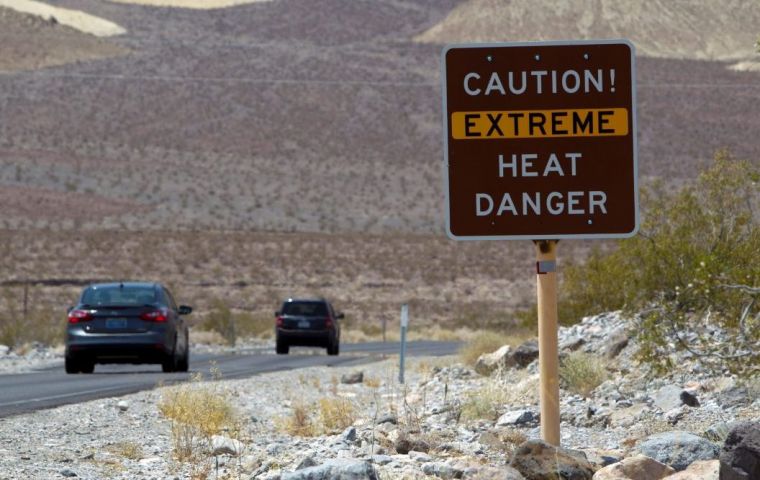MercoPress. South Atlantic News Agency
Hottest temperature in at least a century on Sunday in Death Valley, Mojave Desert
 A heat wave roasting much of the western United States and is expected to continue all week. On Sunday afternoon at Death Valley it soared to 130 Ft (54.4 Celsius).
A heat wave roasting much of the western United States and is expected to continue all week. On Sunday afternoon at Death Valley it soared to 130 Ft (54.4 Celsius). One of the hottest air temperatures recorded anywhere on the planet in at least a century, and possibly ever, was reached on Sunday afternoon at Death Valley in California’s Mojave Desert where it soared to 130 Fahrenheit (54.4 Celsius).
An automated observation system run by the U.S. National Weather Service in the valley’s sparsely populated Furnace Creek reported the record at 3:41 p.m. at the crest of an extreme heat wave, a more frequent occurrence due to climate change.
It was a dry heat: Humidity fell to 7%. But it felt “insanely hot” all the same, according to meteorologist Daniel Berc at the weather service’s Las Vegas bureau. A heat wave roasting much of the western United States would continue all week, he said on Monday.
“It’s literally like being in an oven,” he said in a telephone interview. “Today is another day we could take another run at 130F.”
Tourists on Monday took selfies by an outdoor thermometer at the Death Valley visitor center while avoiding touching metal surfaces with bare skin.
Those who live and work in Furnace Creek, which had a population of 24 in the 2010 census, saw cause for pause in the record.
“We are seeing more records being broken at a daily and monthly level,” said Brandi Stewart, a public information officer for Death Valley National Park who can see the Furnace Creek weather station from her window. “It is significant that we’re seeing more records breaking.”
A temperature of 134F (56.7C) was recorded in Death Valley in July 1913, and Kebili, Tunisia, is said to have hit 131F in July 1931, according to the World Meteorological Organization. But recent research by Christopher Burt, an extreme weather expert, has led some meteorologists to view these older records as the results of observer error.
Climate change has pushed global temperatures to new highs. In Europe, northern Spain broke local heat records in July, while wheat fields in France caught fire.
Guests at The Oasis hotel were being urged to wear hats and sip water relentlessly while outside, according to general manager John Kukreja. He tells guests that extreme heat does strange, deceptive things to the body.
“You’re going to sweat and the sweat’s going to dry instantly and you’re never going to know you actually felt hot,” he said. “Your hair stands on end. It’s almost like you feel like you’re cold, like goose bumps.”




Top Comments
Disclaimer & comment rulesCommenting for this story is now closed.
If you have a Facebook account, become a fan and comment on our Facebook Page!